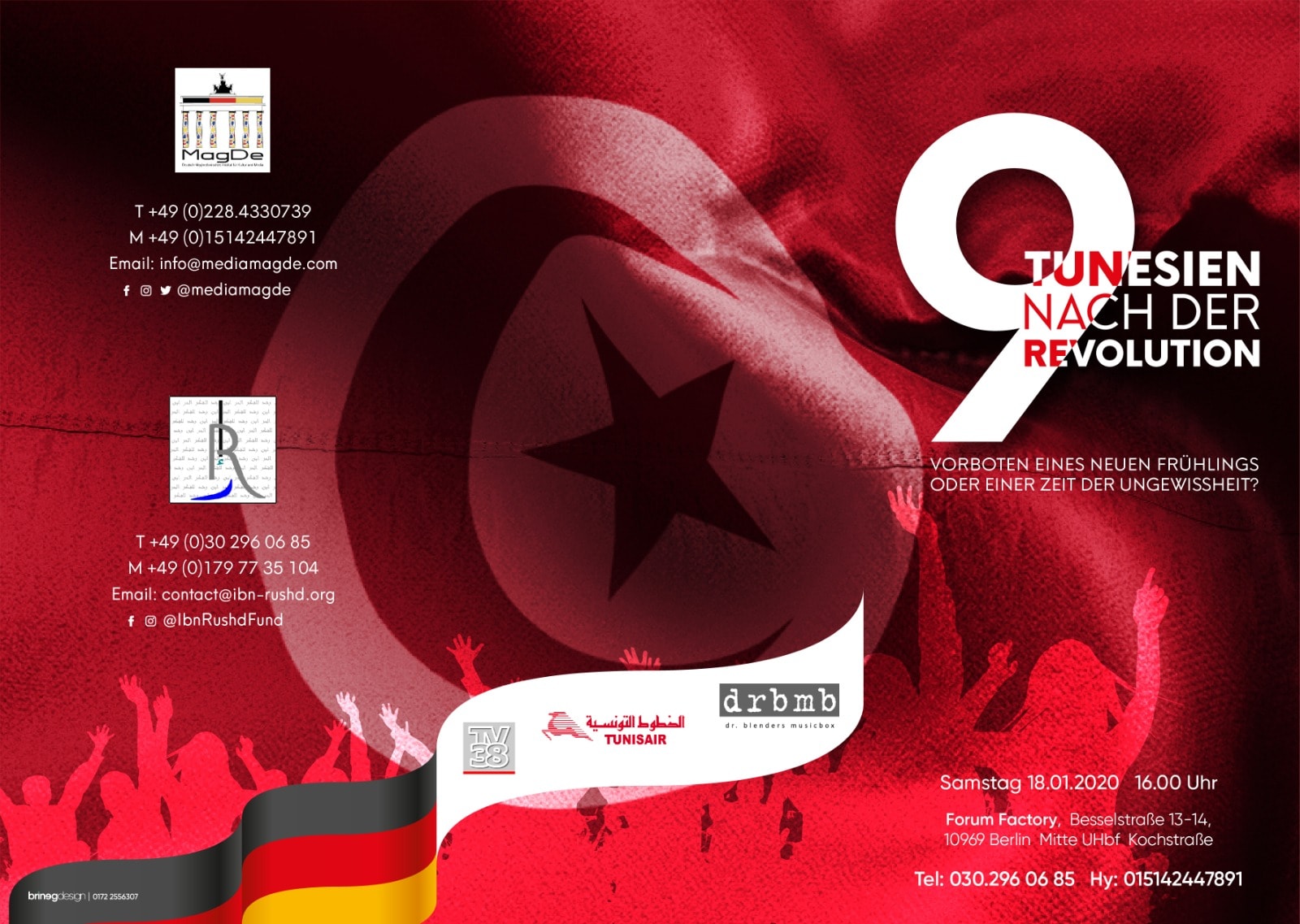Tunesien 9 Jahre nach der Revolution – Vorboten eines neuen Frühlings oder einer Zeit der Ungewissheit?
12-01-2020 22:23:37
Neun Jahre ist es mittlerweile her, daß mit der Flucht des langjährigen Staatspräsidenten Zine al-Abidine Ben Ali am 14. Januar 2011 die später als 'Arabischer Frühling' benannten Revolutionen in zahlreichen arabischen Ländern ihren Anfang nahmen. Dieser Jahrestag dient als Anlaß für eine Podiumsdiskussion mit AktivistInnen und VertreterInnen aus Politik und Wissenschaft, organisiert vom Deutsch-Maghrebinischen Institut für Kultur und Media (MagDe) in Kooperation mit dem Ibn Rushd Fund for Freedom of Thought eV.
Was ist seit der Revolution geschehen in Tunesien, welche Entwicklungen verliefen positiv, was gilt es zu verbessern, wie haben sich die Beziehungen zu Europa entwickelt, nimmt Europa seine Position als Partner ausreichend war, werden demokratische Kräfte in gebührender Weise unterstützt? Wie wirken sich die turbulente Nachbarschaft und die volatile US-Politik auf die junge Demokratie in Tunesien aus?
Dies sind nur einige der Fragen, die zur Diskussion stehen. Fragen und Diskussionsbeiträge aus dem Publikum sind im zweiten Teil der Veranstaltung ausdrücklich erwünscht, die abgerundet wird von einem musikalischen Beitrag und einem landestypischen Buffet, das von der tunesischen Botschaft bereitgestellt wird.
Auf dem Podium diskutieren:
-
Dr. Christian Hanelt, Senior Expert, Bertelsmann Stiftung.
-
Dr. Nabeel Khoury, ehemaliger US-amerikanischer Diplomat und Senior Fellow am Atlantic Council on the Middle East and National Security issues.
-
Dr. Abdelhak Zammouri, Direktor des Abaad Center for Future Studies, Tunis.
-
Prof. Dr. Olfa Kanoun, Lehrstuhl für Mess- und Sensortechnik, Fakultät für Elektro- und Sensortechnik an der TU Chemnitz
-
Dr Malek Seghiri, politischer Aktivist und Wissenschaftlicher Mitarbeiter im Bereich Zeitgenössische Geschichte, Tunis (tbc).
Zudem wurden weitere Persönlichkeiten und AktivistInnen von tunesischer Seite um Kurzbeiträge gebeten, ebenso Experten bzw Abgeordnete auf deutscher Seite.
Ebenfalls zugegen sein wird der Botschafter der Republik Tunesien, Herr Ahmed Chafra.
Die Moderation in deutscher und arabischer Sprache übernimmt Dr. Sarhan Dhouib, Institut für Philosophie, Universität Hildesheim.
Übersetzung: Dr Günther Orth, Dr Sarhan Douib und Morsi Abdelkefi
Bitte um Anmeldung unter dem Link:https://docs.google.com/forms/d/e/1FAIpQLSdyGsALaI9LajWlWFXpOVgTMx3AOI1XjTDyhzziUxj45Oezmw/viewform
Samstag, 18. Januar 2020 16.00 Uhr
Forum Factory, Besselstraße 13-14, 10969 Berlin-Mitte
U6, U-Bhf. Kochstraße; Bus 248, Haltestelle Jüdisches Museum; M29, Haltestelle Charlottenstraße
https://goo.gl/maps/iRJnLy9nkC8RHnq5A
Text - English:
https://www.facebook.com/events/471955353742739/
